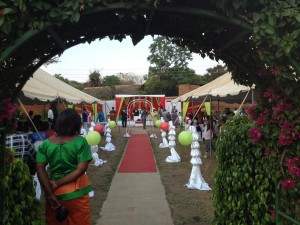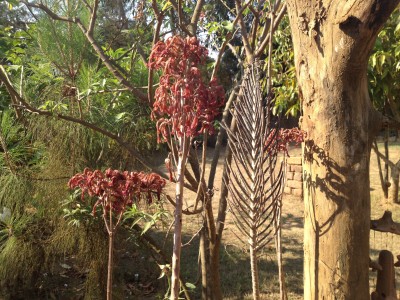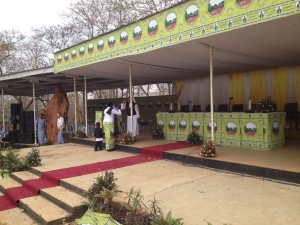One of my housemates and I decided early on in my time in Malawi that we needed a code word that would mean, “Austin, stop worrying about money and schedules. Just enjoy the experience and let go.” We decided that “chocolate chips” would be our secret phrase for capturing this sentiment. That way, regardless of the social situation, my housemate could remind me to let go of control and just be.
The choice of “chocolate chips” was mostly driven by my desire to have anyone coming to Malawi bring me a bag of chocolate chips since they are impossible to find here. Thus, choosing to embrace the moment and let go of worry was dubbed “chocolate chips.”
The first post for Lessons in Lilongwe discussed uncertainty and having to embrace this uncomfortable feeling while doing work here. One of the ways to embrace uncertainty is to just show up, to be present to the moment and not let anxieties about the future or worries about the past cloud the experience of right now. One of my favorite interns from my university’s Newman Center told me my sophomore year about the gift of presence and availability. She told me that one of her jobs as an intern is to just have unstructured time where she was available in case someone needed her. She was merely present.
I should not say “merely present,” though, as choosing to fully engage in the right-now is a courageous act. Choosing to put my phone to the side and just chat with my housemates or to only watch a movie and not multi-task or to purely engage in a work meeting without sending other emails can be difficult. There are so many distractions, so many other things we could be doing. When this intern told me that she feels that being present is part of her job description, I initially found that mindset quite inefficient. Sitting around and being available was not something I could incorporate into my hectic schedule and extra-curricular juggling act.
This was so contrary to the mindset many adopted to succeed on the wards in medical school. Morning rounds were rarely a time to fully engage with the subjective, objective, assessment and plan (SOAP) note of each patient but instead a time to rehearse your two patients’ presentations silently in your head, missing the opportunity to learn from the team’s entire patient list. Noon conference was not for fully participating in whatever lecture had been planned for the residents but instead to do UWorld practice questions on your phone in preparation for the looming shelf exam. Nights and weekends when not on the wards often became less of a chance to commit yourself to loved ones or friends but instead a distracted flurry of venting about your residents and worrying about the attending’s pending evaluation. In medical school, presence escaped me.
Yet being present is exactly what is expected of me here in Malawi and of anyone attempting to do global health. The uncertainty of not knowing when I wake up what I will do at work that day is remedied by just showing up at work and being flexible with what the day brings. If this work could be done from my laptop, within the regimented norms of American schedules, email chains, and adhered deadlines, then I would not need to be in Malawi this year for this research fellowship. My presence in Malawi is the first step in this experience, hence why I flew so far from home. Being present to my co-workers and their concerns rather than focusing on my to-do list and what I want out of my day helps me hear how frustrated they are with their wages. The Malawian kwacha has lost over 30% of its value since July. That means the people here have received a pay cut since I arrived as prices go up and their wages stay the same. Being present to Malawi and its troubles lets you see the front page when it reads ‘Malawi is Broke.’ I wear blinders to the world around me and focus on what I need to succeed, or I could choose to look around and see the context within which I am working.
A good example of presence was the Saturday in September I spent going to both Maula Cathedral’s 50th Golden Jubilee Mass and my co-worker’s wedding reception. I had a rough schedule for the day: jubilee at 9 a.m. and wedding reception at 1 p.m., with time in-between for lunch. But you never know what will happen with “Africa time.” The jubilee Mass seemed to drag on and on. At first it was engaging and novel — seeing girls in matching white dresses and lace gloves dancing up the outdoor aisle to the entrance hymn and releasing 50th birthday balloons in unison in front of the altar. But as the hours dragged on, I began checking the time on my phone more regularly. This was likely my only chance to experience such a Mass while in Malawi this year, yet I was so focused on following my schedule that I was losing my sense of presence. Deep down, though, I knew the wedding reception would not start “on time.” As Mass was finally concluding around 4 hours later, I decided I would stick around for lunch after the jubilee since all were invited, even though that put me arriving at the wedding reception even later. This was a choice to be present to where I was rather than rushing off to where I thought I should be next (or already). Capping off the jubilee service with a traditional Malawian meal with my church community was certainly the right choice, especially as I found I missed very little of the wedding reception by the time I arrived. Plus, none of my co-worker friends had made it there yet anyway.

The aisle to the newly married couple, where people would dance up throwing kwacha (the local currency)…for hours!
I used to think that playing the piano was one of the only ways I could clear my mind from all the scheduling and planning it naturally does when allowed to wander, but I am gradually finding that setting aside time to immerse myself in a research fellowship abroad provides another avenue toward being present to the moment. Choosing to put my phone on silent, close my email inbox and just focus on whatever research task I want to get done in that hour can be so rewarding (and the majority of my US contacts being asleep most of my work day due to the time change is certainly helpful for being more present). In fact, I wrote this entry quite fluidly because the internet was out here, so I could just be present. When you are anxious, worried, uncertain or in solitude, I hope you can choose to embrace the moment and just be available to whatever the present has to offer.
Global health work can seem glamorous, exotic and noble. Lessons in Lilongwe presents introspection and critical observations to illustrate what global health research and living in Africa are really like. Come join Austin on his year off of medical school for a research fellowship in Lilongwe, Malawi.


